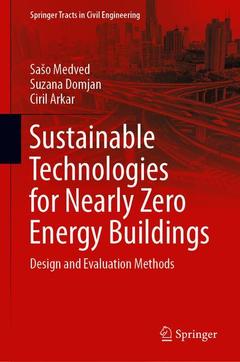Description
Sustainable Technologies for Nearly Zero Energy Buildings, 1st ed. 2019
Design and Evaluation Methods
Springer Tracts in Civil Engineering Series
Authors: Medved Sašo, Domjan Suzana, Arkar Ciril
Language: English
Subjects for Sustainable Technologies for Nearly Zero Energy Buildings:
189.89 €
In Print (Delivery period: 15 days).
Add to cart
Publication date: 02-2019
Support: Print on demand
Support: Print on demand
Description
/li>Contents
/li>Biography
/li>Comment
/li>
This book presents cutting-edge work on the energy efficiency and environmental sustainability of buildings, examining EU policies, regulations and technologies for complex systems such as passive buildings, sustainable buildings and, as part of the Energy Performance of Building Directive (EPBD), nearly Zero Energy Buildings (nZEB) requirements. It explores a wide range of topics, including indoor environment requirements, building physics, in-situ experiments to determine the thermal properties of buildings, nZEB requirements, building service technology, and methods of evaluating energy efficiency and environmental impacts. It also provides an overview of the best available technologies for nZEB, including those for the rational use of energy, utilization of renewable energy sources, EPBD systems and calculation methods. This book is a valuable resource for students, researchers and practitioners of urban planning, and architecture, civil and mechanical engineering.
Indoor comfort requirements .- Energy sources.- Introduction to building physics.- Experimental evaluation of buildings’ envelope thermal properties.- Global climate and energy performance of the building.- Best available technologies (BAT) for on-site and nearby generation of heat for nZEB .- Best available technologies (BAT) for on-site electricity generation for nZEB.- Space heating of nZEB.- Space cooling of nZEB.- Domestic hot water heating in nZEB.- Ventilation of nZEB.- Energy efficient lighting of nZEB.- Energy labelling of buildings.- Environmental labelling of buildings.
Sašo Medved is full professor and head of the Laboratory for Sustainable Technologies in Buildings at the University of Ljubljana, Slovenia. His research focuses on transformation of renewable energy sources, environmental engineering, building physics, the heat and mass transfer in urban environments, mitigating climate change.
Includes case studies and extended graphical presentations Provides theoretical and operative approaches to inspire policymakers and building planners Addresses the most challenging research issues related to energy efficiency, environmental sustainability and building physics
© 2024 LAVOISIER S.A.S.




